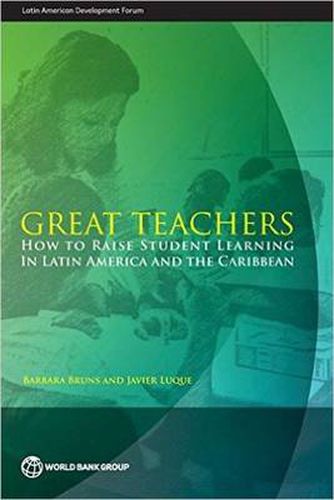Readings Newsletter
Become a Readings Member to make your shopping experience even easier.
Sign in or sign up for free!
You’re not far away from qualifying for FREE standard shipping within Australia
You’ve qualified for FREE standard shipping within Australia
The cart is loading…






The seven million teachers of Latin America and the Caribbean (LAC) are the critical actors in the region’s efforts to improve education quality and raise student learning levels, which lag far behind those of OECD countries and East Asian countries such as China. This book documents the high economic stakes around teacher quality, benchmarks the current performance of LAC’s teachers, and delineates the key issues. These include low standards for entry into teacher training, poor quality training programs that are detached from the realities of the classroom, unattractive career incentives, and weak support for teachers once they are on the job. New research conducted for this report in close to 15,000 classrooms in seven different LAC countries - the largest cross-country study of this kind to date - provides a first-ever insight into how the region’s teachers perform inside the classroom. It documents that the average teacher in LAC loses the equivalent of one day of instructional time per week because of inadequate preparation, excessive time on administration (taking attendance, passing out papers) and a surprisingly high share of time physically absent from the classrooms where they should be teaching. Teachers also make limited use of available learning materials, especially those using information and communications technology (ICT), and are unable to keep the majority of their students engaged. The book sets out the three priority lines of reform needed to produce great teachers in LAC
$9.00 standard shipping within Australia
FREE standard shipping within Australia for orders over $100.00
Express & International shipping calculated at checkout
The seven million teachers of Latin America and the Caribbean (LAC) are the critical actors in the region’s efforts to improve education quality and raise student learning levels, which lag far behind those of OECD countries and East Asian countries such as China. This book documents the high economic stakes around teacher quality, benchmarks the current performance of LAC’s teachers, and delineates the key issues. These include low standards for entry into teacher training, poor quality training programs that are detached from the realities of the classroom, unattractive career incentives, and weak support for teachers once they are on the job. New research conducted for this report in close to 15,000 classrooms in seven different LAC countries - the largest cross-country study of this kind to date - provides a first-ever insight into how the region’s teachers perform inside the classroom. It documents that the average teacher in LAC loses the equivalent of one day of instructional time per week because of inadequate preparation, excessive time on administration (taking attendance, passing out papers) and a surprisingly high share of time physically absent from the classrooms where they should be teaching. Teachers also make limited use of available learning materials, especially those using information and communications technology (ICT), and are unable to keep the majority of their students engaged. The book sets out the three priority lines of reform needed to produce great teachers in LAC